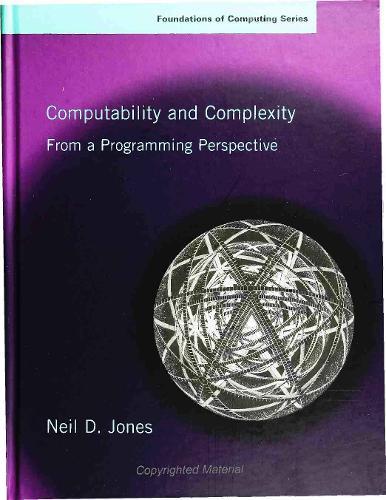Overview
Computability and complexity theory should be of central concern to practitioners as well as theorists. Unfortunately, however, the field is known for its impenetrability. Neil Jones's goal as an educator and author is to build a bridge between computability and complexity theory and other areas of computer science, especially programming. In a shift away from the Turing machine- and Gödel number-oriented classical approaches, Jones uses concepts familiar from programming languages to make computability and complexity more accessible to computer scientists and more applicable to practical programming problems. According to Jones, the fields of computability and complexity theory, as well as programming languages and semantics, have a great deal to offer each other. Computability and complexity theory have a breadth, depth, and generality not often seen in programming languages. The programming language community, meanwhile, has a firm grasp of algorithm design, presentation, and implementation. In addition, programming languages sometimes provide computational models that are more realistic in certain crucial aspects than traditional models. New results in the book include a proof that constant time factors do matter for its programming-oriented model of computation. (In contrast, Turing machines have a counterintuitive ""constant speedup"" property: that almost any program can be made to run faster, by any amount. Its proof involves techniques irrelevant to practice.) Further results include simple characterizations in programming terms of the central complexity classes PTIME and LOGSPACE, and a new approach to complete problems for NLOGSPACE, PTIME, NPTIME, and PSPACE, uniformly based on Boolean programs. Foundations of Computing series
Full Product Details
Author: Neil Deaton Jones (Bukkeballevej 88)
Publisher: MIT Press Ltd
Imprint: MIT Press
Dimensions:
Width: 18.00cm
, Height: 3.60cm
, Length: 22.90cm
Weight: 1.134kg
ISBN: 9780262100649
ISBN 10: 0262100649
Pages: 484
Publication Date: 23 January 1997
Recommended Age: From 18 years
Audience:
College/higher education
,
Professional and scholarly
,
Undergraduate
,
Postgraduate, Research & Scholarly
Format: Hardback
Publisher's Status: Out of Stock Indefinitely
Availability: Out of stock

Reviews
Neil Jones is one of the precious few computer scientists with greatexpertise and leadership roles in both formal methods and complexity.This makes his book especially valuable. Yuri Gurevich, Professor of Computer Science, University of Michigan
Neil Jones is one of the precious few computer scientists with great expertise and leadership roles in both formal methods and complexity. This makes his book especially valuable. --Yuri Gurevich, Professor of Computer Science, University of Michigan
Author Information
Neil Deaton Jones is a retired Professor of Computer Science at the University of Copenhagen.



